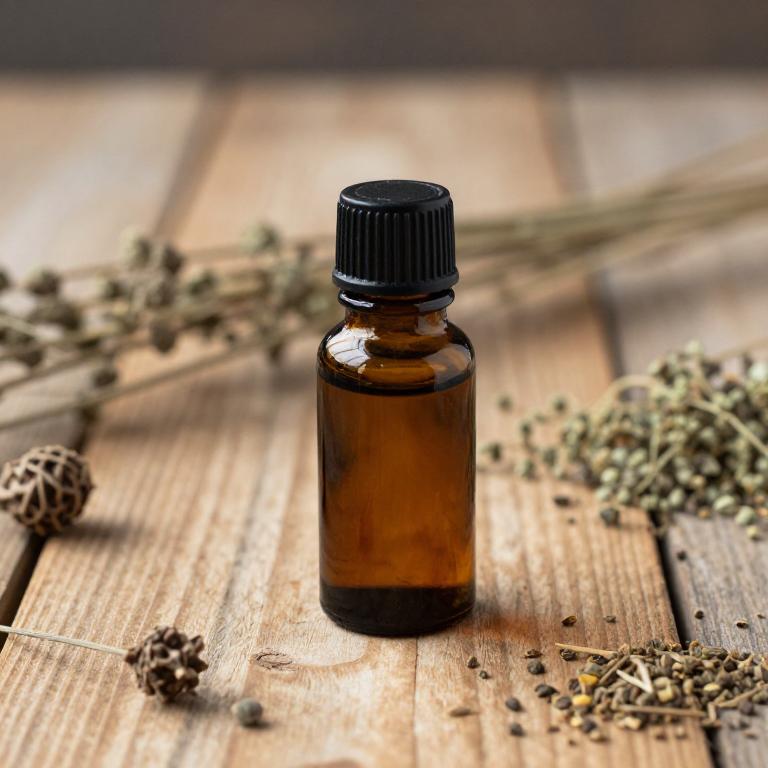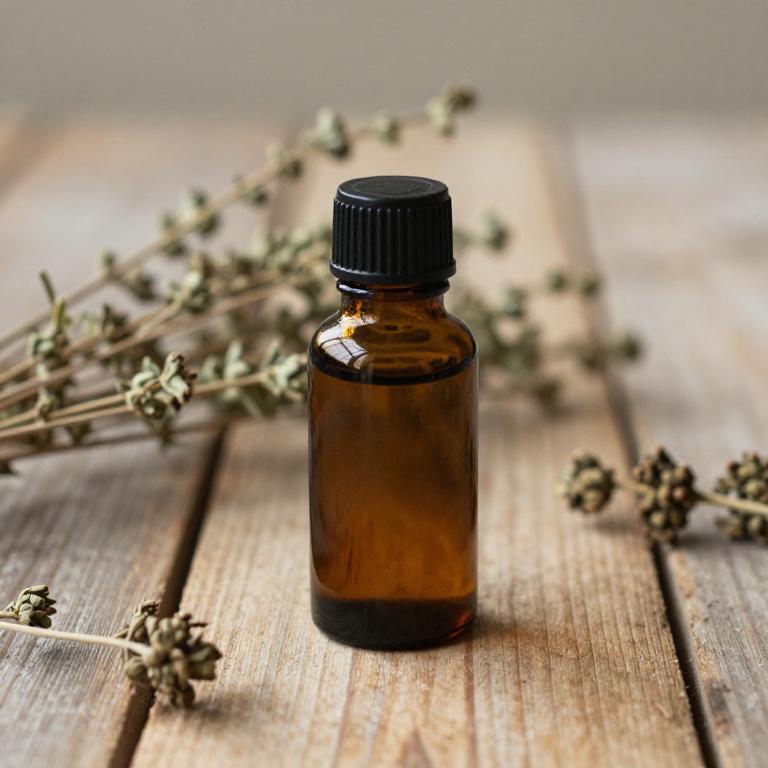10 Best Herbal Essential Oils For Diarrhea

Herbal essential oils have been traditionally used to support digestive health and alleviate symptoms of diarrhea, primarily due to their antimicrobial and anti-inflammatory properties.
Oils such as peppermint, ginger, and lavender are commonly recommended for their ability to soothe the gastrointestinal tract and reduce cramping. Peppermint oil, in particular, has been shown to relax the smooth muscles of the intestines, helping to ease bowel movements and reduce discomfort. However, it is important to dilute essential oils properly before use, as they can be potent and may cause irritation if applied undiluted.
While some studies suggest potential benefits, more research is needed to fully understand their efficacy and safety in treating diarrhea.
Table of Contents
- 1. Ginger (Zingiber officinale)
- 2. Turmeric (Curcuma longa)
- 3. Black pepper (Piper nigrum)
- 4. Ceylon cinnamon (Cinnamomum verum)
- 5. Cumin (Cuminum cyminum)
- 6. Fennel (Foeniculum vulgare)
- 7. Peppermint (Mentha piperita)
- 8. Thyme (Thymus vulgaris)
- 9. Eucalyptus (Eucalyptus globulus)
- 10. Oregano (Origanum vulgare)
1. Ginger (Zingiber officinale)

Zingiber officinale, commonly known as ginger, is widely used in herbal medicine for its essential oils, which possess anti-inflammatory and digestive properties.
The essential oils derived from ginger root contain bioactive compounds such as gingerol and shogaol, which can help alleviate gastrointestinal discomfort. These oils may reduce the frequency and severity of diarrhea by calming the digestive tract and reducing intestinal spasms. Studies suggest that ginger essential oils can enhance gut motility and decrease the secretion of fluids into the intestines.
However, it is important to consult a healthcare professional before using ginger essential oils, especially for prolonged or severe cases of diarrhea.
2. Turmeric (Curcuma longa)

Curcuma longa, commonly known as turmeric, contains essential oils that have been traditionally used for their medicinal properties.
These essential oils are extracted from the rhizomes of the plant and are rich in bioactive compounds such as curcuminoids and volatile oils. Research suggests that the essential oils from Curcuma longa may possess antimicrobial and anti-inflammatory properties, which could help in managing symptoms of diarrhea. By reducing gut inflammation and inhibiting harmful pathogens, these oils may support digestive health.
However, further clinical studies are needed to fully understand their efficacy and safety in treating diarrhea.
3. Black pepper (Piper nigrum)

Piper nigrum, commonly known as black pepper, contains essential oils that have been traditionally used for their digestive benefits.
The essential oils derived from black pepper, particularly those containing compounds like piperine, may help alleviate symptoms of diarrhea by enhancing digestion and reducing gut irritation. These oils are believed to stimulate the secretion of digestive enzymes, which can improve nutrient absorption and regulate bowel movements. However, while some preliminary studies suggest potential benefits, more research is needed to confirm their efficacy and safety for treating diarrhea.
It is important to consult a healthcare professional before using piper nigrum essential oils, especially for individuals with existing health conditions or those taking medications.
4. Ceylon cinnamon (Cinnamomum verum)

Cinnamomum verum, also known as true cinnamon, contains essential oils that have been traditionally used for their antimicrobial and anti-inflammatory properties.
These essential oils may help in alleviating symptoms of diarrhea by reducing gut inflammation and inhibiting the growth of harmful bacteria. The primary components, such as cinnamaldehyde and eugenol, contribute to the oil's ability to support digestive health. However, it is important to use these oils cautiously, as excessive use can irritate the gastrointestinal tract.
While some studies suggest potential benefits, more research is needed to fully understand their efficacy and safety for treating diarrhea.
5. Cumin (Cuminum cyminum)

Cuminum cyminum, commonly known as cumin, is a popular herb whose essential oil has been traditionally used for its digestive benefits.
The essential oil of cumin contains compounds like limonene and cumin aldehyde, which possess antimicrobial and carminative properties. These properties may help alleviate symptoms of diarrhea by reducing intestinal inflammation and promoting healthy digestion. Some studies suggest that cumin essential oil can help regulate gut motility and reduce the frequency of bowel movements.
However, it is important to consult a healthcare professional before using cumin essential oil, especially for prolonged periods or in high concentrations.
6. Fennel (Foeniculum vulgare)

Foeniculum vulgare, commonly known as fennel, is widely used in herbal medicine for its essential oils, which possess carminative and antispasmodic properties.
The essential oil of fennel is particularly effective in alleviating symptoms of diarrhea by reducing gut spasms and improving digestion. It contains compounds like anethol and fenchone, which have a soothing effect on the gastrointestinal tract. Studies suggest that fennel essential oil can help regulate bowel movements and reduce intestinal inflammation.
However, it is important to use fennel essential oil under the guidance of a healthcare professional, as it may interact with certain medications or cause adverse effects in some individuals.
7. Peppermint (Mentha piperita)

Mentha piperita, commonly known as peppermint, is a widely used herb in aromatherapy and herbal medicine, and its essential oil has been traditionally utilized for its digestive benefits.
The essential oil of peppermint contains compounds like menthol and menthone, which have antispasmodic and carminative properties that can help alleviate symptoms of diarrhea by relaxing the muscles of the gastrointestinal tract. Studies suggest that peppermint oil may reduce intestinal inflammation and improve gut motility, making it a potential natural remedy for digestive discomfort. However, it is important to use peppermint essential oil cautiously, as it can sometimes exacerbate symptoms in individuals with certain gastrointestinal conditions.
When diluted properly, peppermint essential oil can be applied topically or inhaled to provide relief from digestive issues like diarrhea.
8. Thyme (Thymus vulgaris)

Thymus vulgaris, commonly known as thyme, is a herb widely used in traditional medicine for its potent essential oils, which contain compounds like thymol and carvacrol.
These oils possess strong antimicrobial properties that can help combat the bacterial or viral causes of diarrhea. When used appropriately, thyme essential oil may support digestive health by reducing inflammation and promoting gut healing. However, it is important to dilute the oil properly before use, as it can be irritating if applied undiluted.
While some studies suggest its potential benefits, it is advisable to consult a healthcare professional before using thyme essential oil for digestive issues.
9. Eucalyptus (Eucalyptus globulus)

Eucalyptus globulus, commonly known as peppermint eucalyptus, is a species of eucalyptus native to Australia and is widely used in aromatherapy and herbal medicine.
Its essential oil is valued for its calming and digestive properties, which may help alleviate symptoms of diarrhea by reducing intestinal spasms and promoting digestive comfort. The oil contains compounds like cineole and limonene, which have antispasmodic and anti-inflammatory effects that can soothe the gastrointestinal tract. While some studies suggest that eucalyptus essential oils may offer relief for digestive issues, it is important to consult a healthcare professional before use, as essential oils can be potent and may interact with certain medications.
Overall, eucalyptus globulus essential oil is a natural remedy that may support digestive health, but it should be used with caution and under proper guidance.
10. Oregano (Origanum vulgare)

Oregano (Origanum vulgare) is a popular herb known for its potent essential oils, which contain compounds like carvacrol and thymol that possess strong antimicrobial properties.
These oils have been traditionally used to help alleviate symptoms of diarrhea by reducing harmful bacterial growth in the gut. Studies suggest that the antimicrobial and anti-inflammatory effects of oregano essential oils can help restore gut health and shorten the duration of diarrhea. However, due to its potency, it is important to use oregano oil in properly diluted form to avoid irritation.
While it may offer natural relief, it should not replace medical advice for severe or persistent cases of diarrhea.